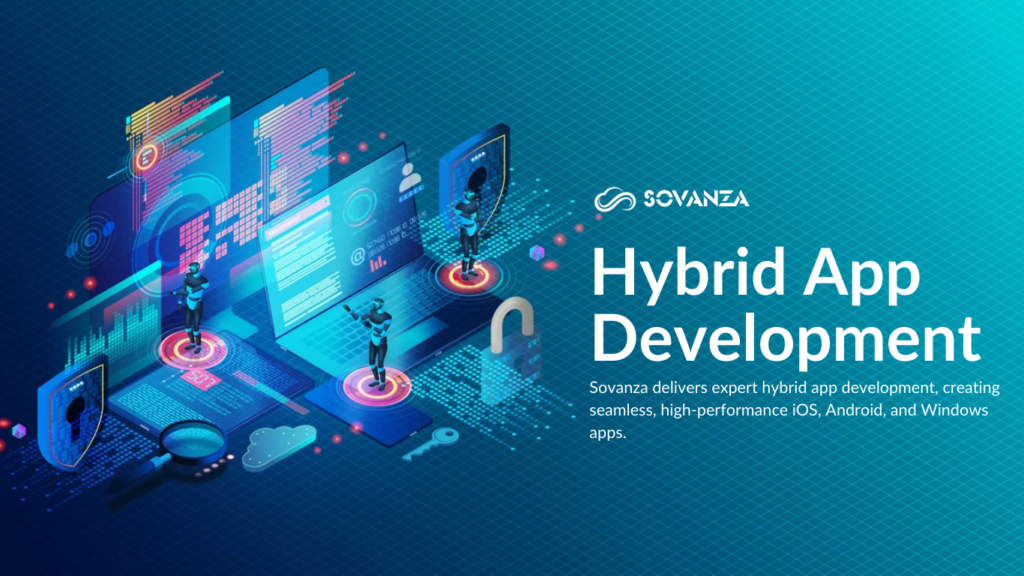
Introduction
Hybrid app development has emerged as a game-changer for businesses looking to create mobile applications that work seamlessly across multiple platforms. By using a single codebase, hybrid apps can run on iOS, Android, and even Windows, allowing companies to reach a broader audience without needing separate apps for each operating system. This approach combines the best elements of both native and web apps, leveraging technologies like HTML, CSS, and JavaScript to create feature-rich applications that still perform like native apps. The growing demand for cross-platform solutions has made hybrid app development an attractive choice for businesses seeking cost efficiency, faster deployment, and ease of maintenance.
At Sovanza, based in the USA, we provide high-quality hybrid app development services tailored to businesses’ unique needs. Our expert team utilizes the latest frameworks, such as React Native, Flutter, and Ionic, to deliver robust, scalable, high-performance mobile apps that work seamlessly across all platforms.
With years of experience and a deep understanding of the ever-evolving mobile landscape, Sovanza is committed to helping businesses across the USA stay ahead of the competition. Whether you’re in e-commerce, healthcare, or any other industry, we ensure that your app delivers an exceptional user experience while meeting your business goals.
What is Hybrid App Development?
Hybrid App Development is creating a mobile application that works across multiple platforms (iOS, Android, and Windows) using a single codebase. It combines elements of both native apps (those designed for a specific platform) and web apps (which run in browsers). Essentially, hybrid apps are built using web technologies like HTML, CSS, and JavaScript. Still, they can access device features and perform like native apps thanks to frameworks like React Native, Ionic, and Flutter.
Why Hybrid Apps are Gaining Popularity
With hybrid apps, businesses don’t have to compromise on performance or user experience. Over time, the demand for apps that function seamlessly across different devices has skyrocketed. Hybrid apps offer cost efficiency, faster development, and easier maintenance, making them incredibly popular among businesses worldwide, especially in countries like the USA.
Key Features of Hybrid Apps Development
Hybrid apps bridge the gap between web and native applications, offering flexibility, cost-efficiency, and a seamless user experience. Here are some standout features:
User Interface (UI) and User Experience (UX)
Hybrid apps are built to provide a seamless and intuitive UI/UX. They integrate the visual design of native apps, making them feel familiar to users, regardless of which platform they are using.
Native-like Performance
While hybrid apps use web technologies, they can still provide a native-like experience. Frameworks that wrap the web code in native containers can be leveraged, allowing the app to interact with device features like cameras, GPS, and more.
Access to Device Features
Hybrid apps can access essential device features like the camera, GPS, accelerometer, and contacts. This feature is one of the key reasons hybrid apps are often favored over traditional web apps, which may be limited in functionality.
Development of Hybrid Apps Procedure
Building a hybrid app requires careful planning and execution. Here’s a breakdown of the process:
Planning and Requirements Gathering
Before starting the development process, clearly defining the project’s objectives is essential. Understanding the needs of your target audience and setting clear goals will help guide the development of your app.
Design and UI/UX Considerations
The design of your app plays a major role in its success. With hybrid apps, ensuring a smooth and user-friendly interface is crucial, as you want the app to feel like a native app. The design phase focuses on creating a seamless user experience across all platforms.
Hybrid App Framework Selection
Choosing the right framework is key to the success of a hybrid app. Some popular frameworks include React Native, Flutter, and Ionic, each with advantages. The right choice depends on your app’s requirements, budget, and timeline.
Development and Testing
Once the design and framework are decided, the development team can begin coding the app. Testing is critical to ensure that the app runs smoothly across all platforms. Hybrid apps require extensive testing to ensure that everything functions as expected.
Launch and Maintenance
After thorough testing, the app is ready for launch. However, the work doesn’t end there. Hybrid apps require ongoing maintenance and updates to ensure compatibility with new operating system versions and fix potential bugs.
Benefits of Hybrid App Development
Hybrid app development offers a powerful blend of cost efficiency, faster development, and cross-platform compatibility. Here are some unique advantages:
Cross-Platform Compatibility
One of the most significant benefits of hybrid app development is its ability to operate on multiple platforms. Whether you’re targeting Android, iOS, or Windows users, hybrid apps can be deployed across all these devices with minimal modifications to the core code.
Cost-Effectiveness
Building separate apps for different platforms can quickly add up in cost. Hybrid app development allows businesses to reduce development costs since the same codebase is used for both iOS and Android. This efficiency is especially useful for startups or small businesses looking to get their product to market quickly.
Faster Time to Market
The development process is faster because you’re working with a single codebase. It means businesses can launch their apps sooner, providing them with a competitive edge in the fast-paced app market. With hybrid apps, there’s no need to wait months for each platform’s version to be completed.
Why Choose Sovanza for Hybrid App Development?
At Sovanza, based in the USA, we specialize in Hybrid App Development that is both cost-effective and high-quality. With years of experience and a team of skilled developers, we can create apps that meet your business needs and offer a seamless experience for your customers. Here’s why you should partner with Sovanza:
Expertise in Hybrid App Development
Our team is well-versed in the latest hybrid development frameworks and tools, allowing us to deliver top-notch apps that perform well across multiple platforms. We ensure seamless functionality, high performance, and an exceptional user experience.
Success Stories from the USA
We’ve successfully developed hybrid apps for various industries in the USA, from e-commerce to healthcare. Our clients have experienced significant cost savings and faster time to market, which is why they continue to trust us for their mobile app development needs.
Challenges of Hybrid App Development with Sovanza
While hybrid apps offer cross-platform efficiency, challenges like performance and platform limitations exist. Sovanza overcomes these with expert solutions.
Performance Issues
While hybrid apps are generally efficient, they may not always match the performance of native applications, particularly for graphics-intensive tasks like gaming. At Sovanza, we optimize
hybrid apps with efficient coding and frameworks to minimize lags and improve responsiveness.
Limited Access to Device-Specific Features
Hybrid applications often face challenges utilizing device-specific features, such as advanced camera controls or real-time GPS tracking. Sovanza bridges this gap by integrating plugins and APIs to enhance functionality and user experience.
Platform-Specific Limitations
Hybrid apps sometimes struggle with platform-specific guidelines, affecting performance consistency across iOS and Android. Sovanza ensures compliance with both platforms’ best practices, reducing discrepancies and delivering a seamless user experience.
Future of Hybrid App Development with Sovanza
As technology advances, hybrid app development is evolving to meet the growing demands of businesses and users. At Sovanza, we stay ahead of emerging trends to build cutting-edge hybrid applications that deliver exceptional performance and user experience.
Trends Shaping Hybrid App Development
Hybrid app development is gaining traction as businesses seek cost-effective and scalable solutions. With powerful cross-platform frameworks like Flutter and React Native, developers can build high-performance apps that work seamlessly across iOS and Android. Sovanza leverages these frameworks to create dynamic, efficient, user-friendly hybrid applications.
Role of AI and Machine Learning in Hybrid Apps
Artificial Intelligence (AI) and Machine Learning (ML) are transforming hybrid apps by introducing personalized user experiences, predictive analytics, and enhanced security features. At Sovanza, we integrate AI-driven chatbots, recommendation engines, and advanced data analytics to make hybrid apps smarter, more intuitive, and highly secure.
Conclusion
Hybrid app development is changing how businesses create mobile apps by making them more affordable and efficient. With frameworks like React Native and Flutter, companies can build apps that work smoothly on iOS and Android. It is especially useful for businesses in the USA that want to reach more customers without spending extra on separate apps for each platform.
At Sovanza, we specialize in creating high-quality hybrid apps that meet the needs of businesses in the USA. We use the latest technology, including AI and machine learning, to make apps smarter and more user-friendly. Whether you need an app for online shopping, healthcare, or business operations, Sovanza can help turn your ideas into reality.
As mobile technology keeps improving, hybrid apps will continue to grow in popularity in the USA and worldwide. They help businesses save time and money while reaching a wider audience. By choosing Sovanza, you get a reliable partner in the USA dedicated to building fast, flexible, and high-performing hybrid apps for your success. Contact us today to learn how our expert team can help you build your next mobile app. Reach out via our website or give us a call to start your project with Sovanza.
FAQS
What are the costs of hybrid app development?
The cost of developing a hybrid app can vary depending on its complexity and the frameworks used. However, due to their single codebase, hybrid apps are generally more cost-effective than native apps.
How long does it take to develop a hybrid app?
The development time depends on the app’s complexity and number of features. On average, hybrid apps take less time to develop than native apps because of the shared codebase.
Can a hybrid app perform as well as a native app?
While hybrid apps may not always match the performance of native apps in resource-heavy applications, they are suitable for most business apps. They can deliver excellent performance with the right frameworks.
What are some popular frameworks for Hybrid App Development?
Popular frameworks include React Native, Ionic, and Flutter. These frameworks help developers create cross-platform apps quickly and efficiently.
Why is Hybrid App Development the future of mobile apps?
Hybrid app development is the future because it offers businesses a cost-effective, faster, and scalable solution. As technology evolves, hybrid apps will improve performance and capabilities.

